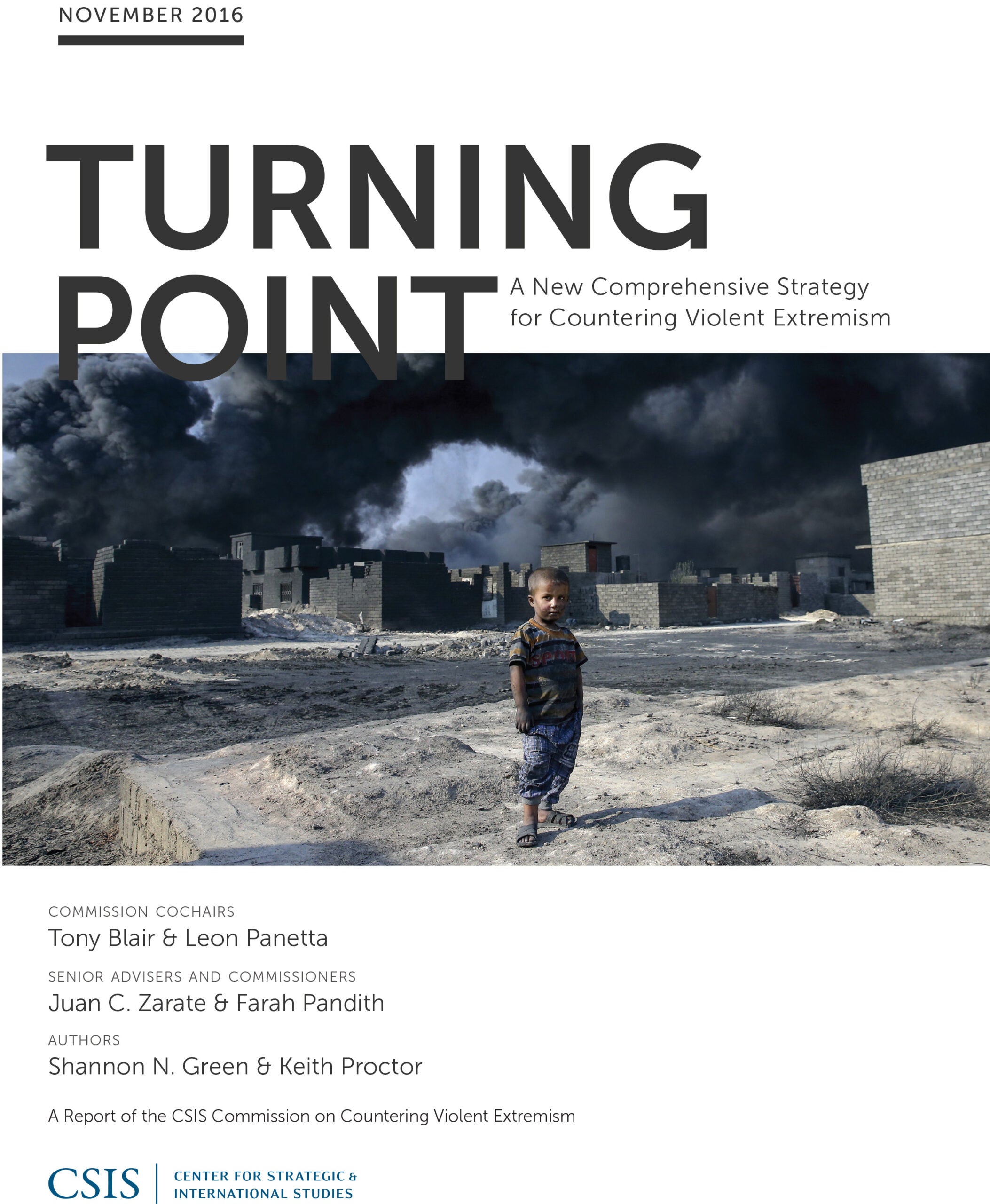Several members of the Center for Strategic and International Studies’ (CSIS) Commission on Countering Violent Extremism gathered at HLS in March to discuss findings from the commission’s November 2016 report, “Turning Point: A New Comprehensive Strategy for Countering Violent Extremism,” which outlines a comprehensive strategy for the United States to diminish the appeal of extremist ideologies and narratives.
The bipartisan CSIS commission, co-chaired by former Secretary of Defense Leon Panetta and former British Prime Minister Tony Blair, was made up of 23 public- and private-sector leaders, including Dean Martha Minow and Juan Zarate ’97, visiting Lecturer of Law and former Deputy National Security Advisor for Combating Terrorism. For the HLS event, Minow and Zarate were joined by fellow CSIS commissioners Nicholas Burns, Goodman Professor of the Practice of Diplomacy and International Politics at Harvard’s Kennedy School of Government, and Mark Penn, president and managing partner of the Stagwell Group.

The commission’s goal was to articulate what the U.S. administration, in close collaboration with governmental and nongovernmental partners, must do to diminish the appeal of extremist ideologies and narratives.
Launched in February 2016, the initiative that produced the report included an 8,000-person survey on violent extremism. Participants were drawn from the United States, the United Kingdom, France, Turkey, Indonesia, Egypt and India.
According to Penn, the eight-country survey that informed the commission’s work provided an understanding of the public perception of terrorism and the drivers of violent extremism, such as religious fundamentalism, poverty, and political strife. “We asked both if people consider terrorism a major problem, which varies from country to country depending on the circumstances and current events there, and then if terrorism poses an existential problem,” he said. “Most people think so. A majority of people think that terrorists are likely to acquire weapons of mass destruction in their lifetime. When you ask why people are so concerned about terrorism, why they want so many resources invested in fighting it, ultimately, you look at this question and it tells you why. ISIS is seen as the number-one threat to U.S. security, with Russia and China as distant seconds.” He noted that respondents want to see more civil action and policy, not military measures, to combat the spread of extremist ideology.
Zarate, offering a domestic policy perspective, concurred. “From a domestic standpoint the goal of CVE isn’t just deterring acts of terrorism, but also ensuring that extremist ideology never takes hold in a fundamental way in any part of American society. To many people, the Boston Marathon bombing showed that we have insufficient off-ramps for young people who are drawn to the ideology. We don’t have enough programs to try to intervene early.” However, soft power solutions such as community outreach and youth intervention are not as simple as providing funding and designing a program. “At the end of the day,” Zarate said, “soft power depends on trust on the domestic side. How we can build trust in the current environment is a fundamental part of this. There’s a perception that soft CVE programs are about targeting particular communities, but, for government, the idea is that CVE should be the easy side of counterterrorism because it’s the soft side. Bridging this gap requires trust, communication, and awareness-building around the reality that ideologues are trying to target particular communities and individuals.”
Minow tackled the challenge of human rights, civil rights, and stigmatization in the context of CVE efforts. She described the inherent tensions in CVE work between free speech and combating extremist ideology and respecting privacy and promoting national security. “The political fight about what you can call people, about whether respectful dialogue is necessary makes these issues harder. What does it take to do the relationship-building work so that those close to a potential perpetrator have some trust in the law enforcement and security communities where prevention programs operate?” Her conclusion: “We need a better conversation, one that doesn’t start by demonizing people.”
Burns connected these issues to the discussions happening on the international stage. “We have to build inclusive societies outside the Arab world. European countries have substantial Muslim populations with no elevator up. There’s no assimilation of those communities; they live in a mosaic, not a melting pot. They don’t feel they can succeed in their societies. We have to make sure that we’re fully democratic in acceptance, signaling, in extending opportunities to Muslims outside of the Arab world.” Although Burns believes that soft power programs are more important in the long-term, he cautioned against minimizing the role of hard power. He said, “There is a military dimension here, largely one that the Arab world and African countries have to organize and we have to help them. The problem has now metastasized to African nations from the Middle East. Even if we defeat ISIS in Mosul, we have a twenty to thirty-year fight of those governments and their people against extremist groups and their offshoots. It’s their battle. But we have to help them through facilitation, expertise, and technology.”